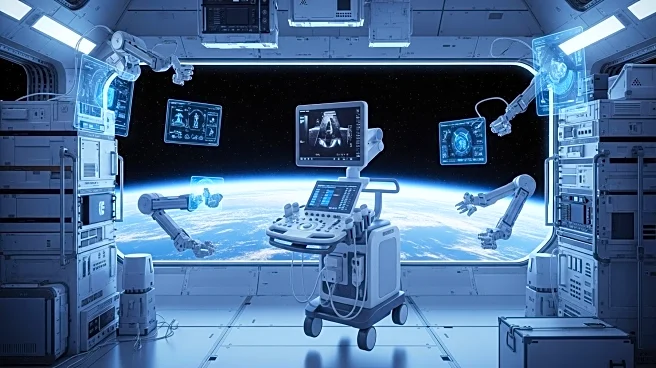What's Happening?
GE HealthCare has sent its Vivid iq ultrasound system to the International Space Station (ISS) to support health research and diagnostics in space. The system, which includes advanced imaging and quantification tools, arrived at the ISS on September 18 aboard a SpaceX resupply vessel. It will be used for general crew health assessments and space research investigations, focusing on bodily analysis such as venous blood flow and heart function during long-duration spaceflights. The research is part of NASA's Human Research Program, which aims to improve astronaut health and develop diagnostic protocols for spaceflight, while also enhancing scanning capabilities for patients on Earth.
Why It's Important?
The deployment of the Vivid iq system to the ISS represents a significant advancement in space health research, potentially leading to improved health measures for astronauts. This initiative could also have broader implications for medical diagnostics on Earth, as the technology developed for space can be adapted for terrestrial healthcare. The research could lead to new protocols that enhance patient care and diagnostic accuracy, benefiting both space missions and healthcare industries. The project underscores the importance of space as a frontier for medical innovation, with potential long-term benefits for public health and medical technology development.
What's Next?
Future steps include conducting in-flight studies to evaluate the effectiveness of the Vivid iq system in space. The results could inform the development of new health measures and diagnostic protocols for both space and Earth applications. NASA and GE HealthCare will likely continue to collaborate on refining the technology and exploring additional applications. The success of this project could encourage further investment in space-based medical research, potentially leading to more advanced healthcare solutions.
Beyond the Headlines
The use of medical devices in space opens new avenues for research that are not possible on Earth due to gravity constraints. This could lead to breakthroughs in manufacturing and medical device development, as demonstrated by previous projects like Auxilium Biotechnologies' 3D bioprinter. The absence of gravity allows for unique manufacturing processes that could revolutionize the production of medical devices, offering new possibilities for innovation in the healthcare sector.









